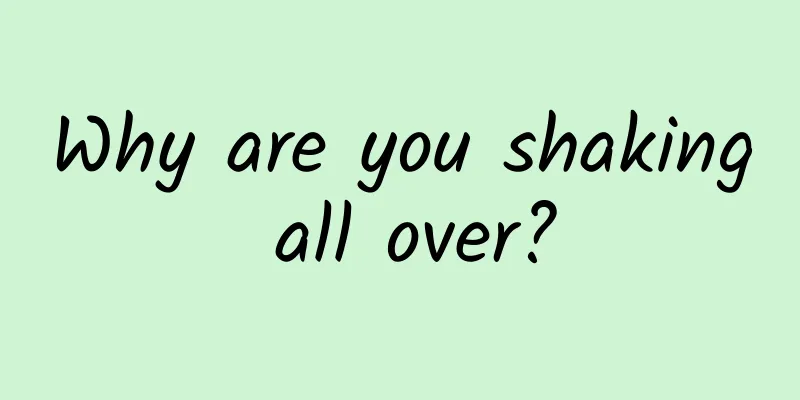Why are you shaking all over?

| In our lives, for example, when the weather suddenly gets cold, or we catch a cold because we are not careful, or when we are exposed to something very stimulating, we will involuntarily tremble all over. Moreover, trembling is the shaking caused by the unconscious contraction of muscles. This trembling can occur in any part of our body, so let us understand what trembling all over is all about! Tremors are shaking movements caused by involuntary contraction of muscles. They can occur anywhere on the body but usually affect the neck, arms, or hands. Most people experience noticeable tremors due to stress, extreme fatigue, excessive caffeine intake, or allergic reactions to medications. Some people have recurrent, severe tremors. The most common causes are Parkinson's disease and inherited tremors. Although hereditary tremors can be troublesome, they do not put your health at risk. Other causes of chronic tremors include alcohol overdose, multiple sclerosis, tumors, stroke, an overactive thyroid gland, and Wilson's disease (a rare genetic disorder that disrupts copper metabolism in the body). Shivering is a function of the body's internal environmental control system. Behind the eyes is a tiny piece of brain tissue called the hypothalamus that is responsible for controlling body temperature. Shivering is the hypothalamus's way of keeping the body at a constant temperature, allowing the body to release energy when it gets cold (conversely, shivering when it gets hot causes a person to sweat). When a person has a fever, signals from the hypothalamus cause the body to heat up further in an attempt to kill harmful germs. Here's how the process works: The body causes the blood vessels just under the skin, which are close to the skin, to constrict while other blood vessels dilate, allowing blood to flow to the site of infection. This diverts blood away from the outer layer of skin, causing you to feel cold. To replenish calories, the thyroid gland begins to contract its muscles, causing shivering. If a person is frightened, they may also tremble. For example, if you are walking home from a late night movie and someone suddenly walks out of an alley, you might be startled. Your brain releases adrenaline throughout your body, preparing you to fight or flee the scene. No matter which reaction you have, your body is in a state of high tension. The body's panic state behaves much like the body's cold state; your blood drains away from the surface of your skin, which causes you to shiver. In an emergency, having blood flowing away from the surface of the skin has the obvious benefit of not bleeding too much even if you get hurt. Hand tremors are divided into intention tremors and non-intention tremors. The former occurs when doing movements and affects motor function; the latter only exists when at rest and does not affect motor function. The former is a problem with cerebellum and vestibular function, and the latter may indicate hyperthyroidism. Of course, some normal people will also have mild tremors. As long as it does not affect the function, just leave it alone. Hand tremors are divided into intention tremors and non-intention tremors. The former occurs when doing movements and affects motor function; the latter only exists when at rest and does not affect motor function. The former is a problem with cerebellum and vestibular function, and the latter may indicate hyperthyroidism. Of course, some normal people will also have mild tremors. As long as it does not affect the function, just leave it alone. There are many reasons for tremors, generally nerve and muscle diseases can cause them. There are also static tremors and tremors associated with movement. Considering whether there is Parkinson's disease, it is recommended to go to the hospital for a detailed examination, X-ray, and CT. It is best to go to the hospital for a thorough check-up. Do not take medicine casually. If you are sick, you must seek treatment in a timely manner and do not delay. |
<<: My throat hurts, what's going on?
Recommend
Chinese medicine for menopause
Women will have their periods at a certain age, a...
Can urticaria be treated with cupping and scraping?
People who suffer from urticaria should never for...
What is the dosage of Wuling Powder?
Wuling San is a kind of traditional Chinese medic...
My butt hurts like a cramp
Leg cramps are quite common in daily life. Medica...
The significance of five items of myocardial enzyme spectrum
Some people may feel unfamiliar with myocardial e...
How long does it take to have sex after miscarriage? How long will it take before I can get pregnant again?
Whether it is an accidental miscarriage or an art...
Whitening and yellowing methods to give you fair and translucent skin
Whitening is a very important thing for women. Da...
What causes heartburn at night?
The occurrence time of many diseases is divided i...
Wangjiangnan Chinese medicine function and indications
Speaking of Wangjiangnan, would you associate it ...
What causes stomach pain?
Stomach pain and bloating are common gastrointest...
Allergic asthma remedies
As we all know, asthma is a common respiratory di...
What to do if your throat is inflamed and has pustules
Many people have inflammation in their throats, a...
There is a hard lump in the neck
The most likely reason for a hard lump growing in...
How long does it take to treat herpes and who is more susceptible to infection?
Genital herpes is a common sexually transmitted d...
How many times should Chinese medicine be boiled?
Many people, when taking Chinese medicinal materi...









